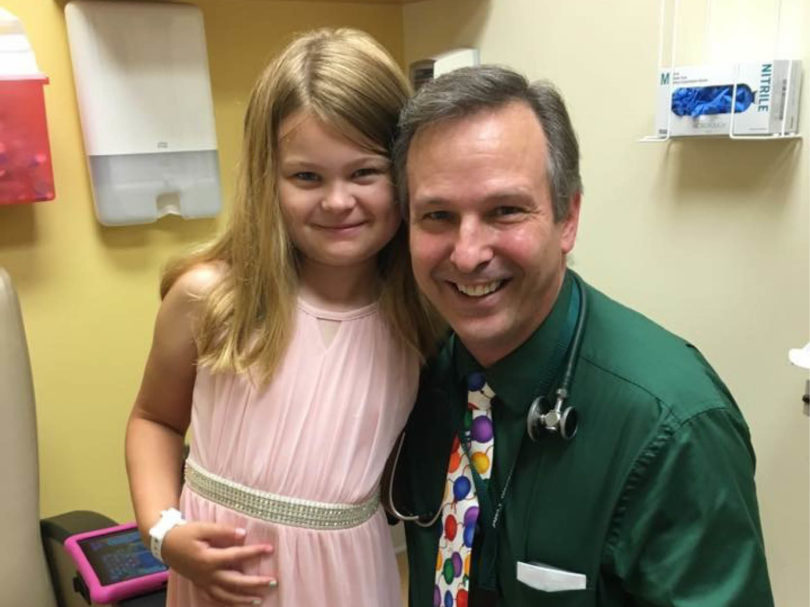For two years after brain surgery, Madison Davis of Hampton remained tumor free.
She had been just 5 years old when the tumor showed up near her brain stem, and doctors quickly operated to remove it. Surgery was followed up with seven weeks of proton radiation therapy.
Repeated MRIs every few months were clean—no signs of the tumor. Anyone who spent time around the happy, bubbly girl found it hard to believe she had ever been sick.
“It was almost to the point you could breathe,” said Madison’s mother, Melanie Davis. “Almost.”
But in April 2016, an MRI came back abnormal. The tumor was back, this time the size of an M&M. Again, Madison went under the knife at the Children’s Hospital of Philadelphia, where her first surgery took place. Again, her surgeon was fairly sure he had removed the tumor from her brain.
That didn’t mean the end.
Removal wasn’t enough for Madison’s parents. Melanie, an emergency room nurse, immediately began researching further options, including clinical trials. Eventually, her research led her to a clinical trial for children with recurring brain cancers at the Georgia Cancer Center at Augusta University—the first of its kind in the nation.
Melanie and her husband, Ben, wanted to try and ensure their daughter’s cancer never came back. So Madison, who by then was 7, was enrolled in the trial.
January marked six months since Madison has been part of the trial, which is testing the effectiveness of combining an immunotherapy drug with chemotherapy and radiation therapy to prevent further tumor recurrences. The results of Madison’s most recent MRI—which the family received December 30th, the day before her 8th birthday, were cause for celebration:
“No residual, no recurrence.” In other words, all clear.
So far, Maddie has remained in remission ever since her surgery, which is wonderful news,” said Dr. Theodore Johnson, the doctor who is heading the trial at the Georgia Cancer Center.
The trial is testing an experimental drug called Indoximod, which was discovered at the Medical College of Georgia and licensed to NewLink Genetics Corporation for clinical development. Researchers are hoping that combining the drug with chemotherapy or radiation therapy will increase the effectiveness of the treatments, and hopefully keep tumors from coming back.
Indoximod is a type of drug called an IDO-inhibitor. IDO is a kind of enzyme, or protein, that affects other proteins in the body. Doctors think that tumors use IDO to avoid the body’s immune system. The hope is that by blocking the enzyme, the body can attack tumor cells more effectively.
Currently, IDO-inhibiter drugs are in development for a variety of adult tumors as new immunotherapy treatments, Johnson said. Generally, there are not many clinical trials for kids with cancer. There are more adults than children with cancer, and researchers want to make sure drugs are safe for adults before they try them on children.
But because the drug was created right there in Georgia, and because the drug company was open to doing pediatric clinical trials, the trial was given the green light.
Pre-clinical lab tests showed that Indoximod just might work for children, if paired with chemotherapy. Johnson enrolled the first child in the trial in December 2015, and now has 19 signed up.
“We’ve been very excited just to be able to provide this option,” Johnson said. “When I get calls from families, they are sometimes essentially out of options.”
Phase I of the trial is testing toxicity, rather than being used for treatment, so all the kids enrolled have gotten different doses. Some kids started with their tumors removed, some had residual tumors, others had multiple tumors. During the course of treatment, there have been varying results—some tumors have shrunk. Others have stabilized. Some tumors have grown. In Madison’s case, Johnson hoped to enlist her immune system to respond to any potential bit of tumor surgery and radiation left behind. Sometimes, what’s left can be microscopic.
After beginning Indoximod last summer, Madison went through seven weeks of radiation therapy before starting on a 12-cycle regimen of chemotherapy. She was expected to begin her 5th cycle in January.
The drug, so far, has been well-tolerated by children, which has been a thrilling surprise, Johnson said. Kids are reporting that their quality of life is good or improved.
“The bar is very high for treatment relapsed brain cancer in kids,” Johnson said. “There are no proven therapies. Right now, there’s really not a great second line treatment if they don’t respond to the first treatment.
“Early indications are that [the trial] is very promising,” he added. “We’re very excited that we might have a fairly non-toxic therapy that can be added to chemotherapy in the future.”
As for Maddie, the second grader with the streaky pink hair – because, why not? — shows hardly any effects of the past year, which meant traveling back and forth to Georgia numerous times for treatment. The family’s travels are covered by Alex’s Lemonade Stand Foundation. Her neck remains a little stiff from surgery, but her parents hope that therapeutic massage will help.
Maddie is always eager to get back to school. To be around her friends. To play in the snow with her doting big brother, Aiden.
To just be a kid—without cancer.







